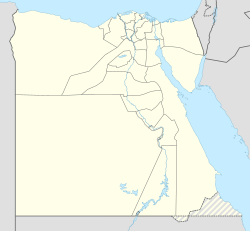RAF Heliopolis
| RAF Heliopolis | |||||||
|---|---|---|---|---|---|---|---|
| Heliopolis, Cairo, Cairo Governorate in Egypt | |||||||
| Coordinates | 30°05′01″N 31°18′49″E / 30.08361°N 31.31361°E | ||||||
| Type | Royal Air Force station | ||||||
| Site information | |||||||
| Operator | Royal Air Force | ||||||
| Site history | |||||||
| Built | 1916 | ||||||
| In use | 1916–1944 | ||||||
| Battles/wars | Mediterranean and Middle East theatre of World War II | ||||||
| Airfield information | |||||||
| |||||||
Royal Air Force Heliopolis or more simply RAF Heliopolis is a former Royal Air Force station located to the east of Cairo City centre, Cairo Governorate, Egypt.
During World War I the aerodrome was operated by the British Royal Flying Corps, housing several squadrons as well as a training wing, and then the Royal Air Force, being designated RAF Heliopolis in April 1918.[1] In the inter-war period it remained an active RAF base, housing several squadrons, including No. 208 Squadron RAF which was based there almost continuously from 1927 until 1942.[1]
At the end of a training regime from January to mid-March 1942 (involving the handling of Italian and German weapons, sabotage and parachutism), the French SAS company executed a surprise mock attack against the aerodrome of Heliopolis without the knowledge of the garrison and its commander.[2]
History
[edit]

The following RAF squadrons were also here at some point:
- Detachment from No. 6 Squadron RAF between February and April 1941 with the Hawker Hurricane I[3]
- Detachment from No. 11 Squadron RAF between May and June 1940 with the Bristol Blenheim I[4]
- No. 14 Squadron RAF between 12 April and 1 May 1941 with the Blenheim IV[5]
- No. 17 Squadron RAF between 18 December 1915 and 2 July 1916 with the Royal Aircraft Factory B.E.2C[6]
- No. 30 Squadron RAF between 19 and 25 February 1942 with the Hurricane I[7]
- No. 33 Squadron RAF between 29 September and 3 October 1938 with the Gloster Gladiator I[8]
- No. 39 Squadron RAF between 7 and 13 May 1940 with Blenheim I[9]
- No. 40 Squadron RAF between 13 and 20 January 1943 with the Vickers Wellington IC[9]
- No. 45 Squadron RAF between 25 April and 21 October 1927 with the Airco DH.9A[10]
- No. 55 Squadron RAF between 15 February and 10 March 1941 with the Blenheim IV[11]
- No. 58 Squadron RAF between 2 May 1919 and 1 February 1920 with the Handley Page Type O/400 and the Vickers Vimy[12]
- No. 64 Squadron RAF between 1 March and 9 April 1936 with the Hawker Demon[13]
- No. 67 Squadron RAF between 12 September and 17 December 1916 with the B.E.2C and the Avro 504K[14]
- No. 70 Squadron RAF between 1 February 1920 and 16 January 1922 with the HP 0/400[14]
- No. 73 Squadron RAF between 30 November and 30 December 1940 with the Hurricane I[15]
- Detachment from No. 80 Squadron RAF between November 1943 and January 1944 with the Spitfire IX[16]
- No. 84 Squadron RAF between 24 September and 16 November 1940 with the Blenheim I[17]
- No. 92 (East India) Squadron RAF between 30 April and 4 August 1942 without any aircraft[18]
- No. 113 Squadron RAF between 11 May and 29 September 1938 with the Hawker Hind[19]
- No. 173 Squadron RAF between 9 July 1942 and 29 February 1944 with multiple aircraft[20]
- No. 206 Squadron RAF between 19 and 27 June 1919 with the DH.9[21]
- No. 208 Squadron RAF between 27 October 1927 and 24 January 1936 with the Hawker Audax[21]
- No. 211 Squadron RAF between 23 and 27 April 1941 with Blenheim I[22]
- No. 216 Squadron RAF between 15 April 1921 and 7 October 1941 with multiple aircraft[23]
- No. 267 Squadron RAF between 20 August 1940 and 18 August 1942 with multiple aircraft[24]
- Detachment from No. 272 Squadron RAF between March and November 1942 with the Bristol Beaufighter IC[25]
- Detachment from No. 417 Squadron RCAF between October 1942 and January 1943 with the Spitfire VC[26]
- No. 451 Squadron RAAF between 27 January and 16 February 1942 with Hurricane I[27]
Current use
[edit]After the Second World War, the site was turned into an army barracks then, turned into the Egyptian Air Force Headquarters.
See also
[edit]References
[edit]- ^ a b Barrass, M. B. (22 May 2014). "RAF Stations (H)". Air of Authority – A History of RAF Organisation. Retrieved 3 September 2016.
- ^ Le Mire, Henri (1980). Histoire des parachutistes français : la guerre para de 1939 à 1979. Paris: A. Michel. p. 21. ISBN 2-226-00890-X. OCLC 6774791.
- ^ Jefford 1988, p. 25.
- ^ Jefford 1988, p. 27.
- ^ Jefford 1988, p. 28.
- ^ Jefford 1988, p. 29.
- ^ Jefford 1988, p. 34.
- ^ Jefford 1988, p. 36.
- ^ a b Jefford 1988, p. 38.
- ^ Jefford 1988, p. 39.
- ^ Jefford 1988, p. 42.
- ^ Jefford 1988, p. 43.
- ^ Jefford 1988, p. 45.
- ^ a b Jefford 1988, p. 46.
- ^ Jefford 1988, p. 47.
- ^ Jefford 1988, p. 49.
- ^ Jefford 1988, p. 50.
- ^ Jefford 1988, p. 52.
- ^ Jefford 1988, p. 56.
- ^ Jefford 1988, p. 65.
- ^ a b Jefford 1988, p. 69.
- ^ Jefford 1988, p. 70.
- ^ Jefford 1988, p. 71.
- ^ Jefford 1988, p. 81.
- ^ Jefford 1988, p. 82.
- ^ Jefford 1988, p. 91.
- ^ Jefford 1988, p. 93.
- Jefford, C. G. (1988). RAF Squadrons. A comprehensive record of the movement and equipment of all RAF squadrons and their antecedents since 1912. Shrewsbury, UK: Airlife Publishing. ISBN 1-85310-053-6.

